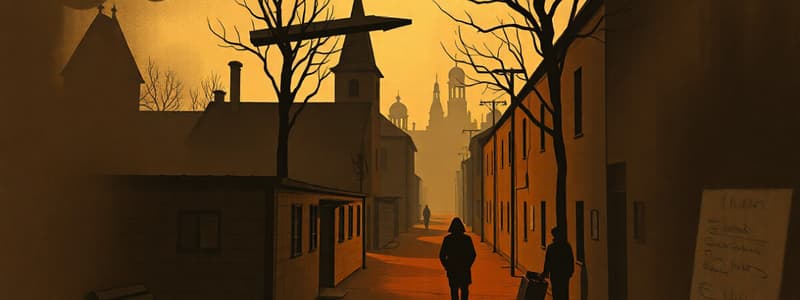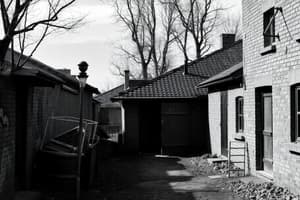Podcast
Questions and Answers
Based on the diary entries, what was a primary, recurring concern for the diarist?
Based on the diary entries, what was a primary, recurring concern for the diarist?
- The daily struggle to obtain and ration food. (correct)
- The lack of available entertainment and social activities.
- The constant threat of air raids by Allied forces.
- The limited access to educational resources and opportunities.
What event caused the diarist to feel 'completely broken'?
What event caused the diarist to feel 'completely broken'?
- Witnessing a public celebration in the ghetto.
- Being informed of a new job opportunity outside the ghetto.
- Learning about the deportation of her sister's friend. (correct)
- Receiving news of a friend's upcoming wedding.
What was the father's occupation within the Lodz Ghetto?
What was the father's occupation within the Lodz Ghetto?
- A painter involved in ghetto construction. (correct)
- A doctor providing medical care to residents.
- A tailor producing clothing for the German army.
- A teacher educating children in secret classrooms.
Which location served as a death camp where residents of the Lodz Ghetto were deported?
Which location served as a death camp where residents of the Lodz Ghetto were deported?
What does the diary reveal about the diarist's family's primary language?
What does the diary reveal about the diarist's family's primary language?
In March 1942, what was a primary concern for people within the ghetto?
In March 1942, what was a primary concern for people within the ghetto?
What was the girl's mother doing to earn money to support her family?
What was the girl's mother doing to earn money to support her family?
What prompted the girl to have a fight with her father?
What prompted the girl to have a fight with her father?
What did the girl miss most in the ghetto?
What did the girl miss most in the ghetto?
What does the text infer happened to the anonymous girl?
What does the text infer happened to the anonymous girl?
Flashcards
Lodz Ghetto
Lodz Ghetto
A Jewish ghetto in Poland during WWII, fully occupied by Germany.
Deportations to Lodz Ghetto
Deportations to Lodz Ghetto
Forced relocation of Jews to the Lodz Ghetto from 1940 onwards.
Chelmno Death Camp
Chelmno Death Camp
The site to which Jews were deported from Lodz Ghetto, where many were killed.
Daily struggles in the ghetto
Daily struggles in the ghetto
Signup and view all the flashcards
Entry dates of diary
Entry dates of diary
Signup and view all the flashcards
Tuberculosis of the pharynx
Tuberculosis of the pharynx
Signup and view all the flashcards
Deportations
Deportations
Signup and view all the flashcards
Ghetto
Ghetto
Signup and view all the flashcards
Ration
Ration
Signup and view all the flashcards
Arbeit Lager
Arbeit Lager
Signup and view all the flashcards
Study Notes
Lodz Ghetto Diary of an Anonymous Girl
-
Location: Lodz Ghetto, Poland, occupied by Germany. Isolated geographically, making trade and contact extremely limited.
-
Family Structure: Mother (machine operator), Father (construction painter), Sister (17), Brother (16), and the diarist (likely youngest). Spoke Polish.
-
Historical Context:
- September 1, 1939: German invasion of Poland.
- Summer 1940: Jewish residents deported to the Lodz Ghetto.
- December 7, 1941: Deportations to Chelmno Death Camp begin.
- January-May 1942: Mass gassing of 54,900 Lodz Ghetto residents at Chelmno.
- February 27 - March 18, 1942: Period covered by the diary.
-
Living Conditions: Extremely harsh and characterized by a consistent struggle for food. Daily life involved searching for food, waiting in queues for rations, meticulously measuring and recording food intake and quality, and frequent hunger.
-
Diary Entries (Themes):
- Suffering: Deeply emotional entries expressing anguish about deportations, and witnessing the suffering of others. The experience of seeing those she knew being sent to death and extreme starvation.
- Deprivation: Constant worry about food scarcity, the diary vividly details her and her family's desperate struggle to survive.
- Loss: The diary expresses sorrow for loss of life (brother, mother, friend, etc)
- Family Conflicts: Frequent arguments and conflicts, particularly with father over food. Diarist expresses guilt and regrets over her actions and struggles with her own behavior. Indicates struggles within her family due to hardships.
- Desire for Freedom: Yearning for a normal life and freedom from the oppressive conditions.
-
Diary Ending & Fate: The diary abruptly ends mid-sentence, suggesting an interruption or loss of further entries. The author and her family are presumed to have perished in the Lodz Ghetto. The diary was discovered in 1945.
Studying That Suits You
Use AI to generate personalized quizzes and flashcards to suit your learning preferences.


